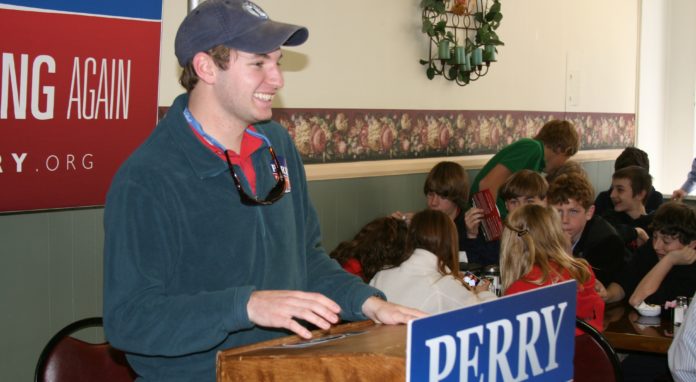Thirty Mercer students are getting front-row seats to presidential politics over the next couple weeks.
Fifteen of them are flying to Iowa today, where they will spend five days observing and volunteering with political campaigns before the Democratic caucuses Feb. 3. The other 15 students will travel to New Hampshire next week in advance of the Democratic primary Feb. 11.
These Bears are political science, communications and journalism majors in a special topics course on presidential primaries, communications and the media, which is supported by Mercer’s Research That Reaches Out program.
Dr. Chris Grant, professor and chair of the Department of Political Science, has taught the course at Mercer during every presidential primary election since 2008. He said the course has been a big success, and it’s even better this semester.
For the first time, the class is being co-taught by Dr. Jay Black, associate professor and chair of the Department of Journalism and Media Studies, and Dr. Kevin Cummings, professor and chair of the Department of Communication Studies and Theatre Arts. Students see the different sides of primary elections as each professor teaches theories and concepts related to their fields, Dr. Black said.
With President Donald Trump running for re-election on the Republican side, most of the campaign action is on the Democratic side this year, Dr. Grant said. Right now, Iowa voters are 40-percent undecided regarding the Democractic nomination, so the race is still very much up in the air. The Iowa and New Hampshire results influence other voters and give a lot of momentum to the campaigns.
By the time Georgia’s primary election rolls around in late March, the candidates’ campaigns will have become so huge and the events so heavily attended that it would be hard for students to get directly involved. However, the Iowa and New Hampshire events are so early in the nomination process that students are able to gain a better understanding of what’s happening and get hands-on experience on the ground.

“It’s fascinating to get to see the process in Iowa and New Hampshire because a lot of what happens really does affect the options of voters down the road. It affects funders. People give money to candidates who they think are going to win,” Dr. Grant said.
The students and their faculty advisers will spend two days seeing candidates in action at campaign events such as rallies, debate watch parties, town hall meetings and canvass launches. They will try to get a sense of the candidates’ communication styles and strategies and how the press is covering them.
Students will also volunteer with campaigns of their choice for two days. In the past, students have done phone-banking and door-to-door campaigning, distributed flyers and literature, held campaign signs and helped set up rallies.
“They wind up doing all sorts of things just to get a feel for campaign work and what goes on,” Dr. Grant said.
Each Mercer group will stay through the caucuses on Feb. 3 or primary on Feb. 11 and attend some of the parties afterward. Every day will be nonstop, with the participants sometimes getting started as early as 7 a.m. and not finishing until 10 or 11 p.m. In the past, Mercer students have been spotted on TV news and interviewed for stories. Two students were even in a photo on the front page of The New York Times.
“When the political process becomes personal, then they can bring back their knowledge to other students,” Dr. Black said. “That way, not just the participants become better citizens but other students do, as well, from their firsthand observations.”
Dr. Black participated in the 2016 trip to New Hampshire and said it was a “mind-blowing experience” for him as the Mercer group was able to spend time and talk with the candidates and observe famous reporters on the job.
“I’m hoping that they’ll be able to analyze their own bias but also have a better understanding that there’s more than just a horse race involved,” Dr. Black said. “I want my students to have a better understanding of who they are voting for. I want them in the future to have a better understanding of how to read candidates through the media.”
When the students return to Macon, they will work on group research projects and present them at the University’s annual BEAR (Breakthroughs in Engagement, Arts and Research) Day on March 26-27.










